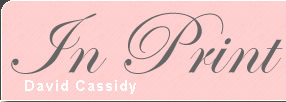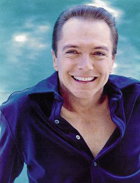
David Cassidy: Kim Carnes Recalls Wild Times With Teen Idol
"It wasn't supposed to end this way," says "Bette Davis Eyes" singer, who toured with Cassidy at the height of his popularity

By Kim Carnes
November 22, 2017
www.rollingstone.com
A decade before she turned the 1981 single "Bette Davis Eyes" into a Grammy-winning phenomenon, Kim Carnes and her husband, Dave Ellingson, were living in Los Angeles and writing songs for music publisher and producer Jimmy Bowen at the same company that would launch the Eagles' Glenn Frey and Don Henley and writer J.D. Souther. Carnes and Ellingson, who now reside in Nashville, would be called on to join David Cassidy on tour, opening shows and singing backgrounds, not long after the September 1970 debut of ABC's The Partridge Family, which transformed the then 20-year-old into a global superstar.
For Carnes, however, her memories of Cassidy Ė who died Tuesday at 67 Ė were not of the teen idol that delighted throngs of adoring fans. Her reflections are of a young man who appreciated his success but held his family and closest friends in highest regard, an artist who would work long hours on the set of the series, which ran for four years, then tour throughout the world on the weekends, singing the familiar hits, including the three-week Number One "I Think I Love You." When he needed a respite, Cassidy would escape to Carnes and Ellingson's L.A. home, spending nights engaged in hours of casual, sometimes intense conversation, accompanied by wine and weed. In a Rolling Stone exclusive, Carnes remembers Cassidy in her own words.
The story of the singer, actor and songwriter beyond Keith Partridge
I wasn't watching The Partridge Family, but everybody knew who he was, because, instantly Keith Partridge became so huge. A friend of Dave's and mine, Richard Delvy, was a record producer, and we had done a bunch of background voices for him on projects he was working on. He called us out of the blue and said, "I've been asked to be musical director, to put a band together for David Cassidy, and do two nights." At first they were just to see if anybody's interested and would show up. Well, yeah, they did, in the thousands! The shows sold out immediately. Our job was to do the first 30 minutes of the show, then there'd be an intermission and we would sing backgrounds for David's part of the show.
The first date we did, we were greeted with thousands of screaming girls: "We want David!" It was like, "Oh, shit! What are we doing here?" So Dave quickly realized that we needed to talk about David. He'd say, "You know, David is backstage getting ready for the show, and he really wants us to tell you he's very excited to come out here, but he also wants you to listen to our songs while he's getting ready." So that really took care of it. What also helped is we did a column, "Kim and Dave on Tour with David Cassidy," for Partridge Family Magazine, which was under the umbrella of Tiger Beat. I would sit up in bed at night and write the questions, like, "Dear Kim, Gee, David's drummer, is really cute. What's he like?" and I'd write back, "Yeah, I agree, he is really cute. He's a great guy and he's a really great drummer!" We were getting to know these girls because some came to every single show. I never will know how they could do that, because they were all school-aged. They were David fans, but they became our fans also.
After the first two shows, it was clear that, yes, in fact, David's concerts did work. So shows were put together really quickly. David was working as Keith Partridge all week, and then he had to get on a red-eye on Friday night. We'd fly all night and then we'd do two shows and then take a red-eye back to L.A. Dave and I could go back to songwriting, but David had to be on the set early Monday morning, so the schedule for him was insane. It was amazing to us how he had never been on stage in front of thousands of people as a "rock star" before this, and from the first show, he knew exactly what to do, how to give his fans exactly what they wanted. The way he moved, he was really impressive. He stepped into the role perfectly, and did it so well. We felt so badly for David because in his reviews they would usually just blast him. He couldn't just brush it off. It made him feel horrible. Over the years, he would gradually introduce songs that weren't Partridge Family songs into the show, just so he could be a little more satisfied. He longed to be able to make the kind of records that he loved to listen to. He used to say, "The problem is my name is David Cassidy, and nobody takes what I do seriously."
I remember for most shows, they'd have to put him in a disguise and sneak him out of the venue. There were girls all night long, pounding on doors of the hotel room. They would find out where we all were staying. Many shows, especially in the summer, outside in the heat, his fans would press each other to get up to the front, and from our vantage point on stage, we were watching as girls would faint, their bodies would be held by the crowd and taken to the back, where there were waiting ambulances. It was just that crazy.
As David used to say, he couldn't go to a market, he couldn't go out anywhere, and our house became a safe place for him. We'd get out a bottle of wine and smoke a joint and put on this collection of really whacked-out, crazy, bad records, and we'd put on the same records time and time again, and laugh just as hard every time about them. But then, we'd put on what we all liked: Buffalo Springfield, Crosby, Stills & Nash, Jimi Hendrix, Jeff Beck. It was just the three of us. We would go well into the night, and many nights he ended up sleeping on our couch because it was too late to drive home. Then we started writing songs together. My favorite of the songs we wrote with David was called "Can't Go Home Again." And now that this has ended in the wrong way, in a way it was never supposed to end, I can't get it out of my head. Little did we know that we were kind of writing about David's life, too, when we were writing that song. We weren't specifically at the time, but now, it becomes very poignant.
During the time we were touring with him, I released my first album, produced by Jimmy Bowen on Bell, so when we would go to cities, I would go to radio promoting that album. But by the end of '74, I was about to record my first album for A&M, and I also was pregnant, so that's why we stopped touring with him.
The times we saw David after that were way too few. I say this now with huge regret. We missed our nights together. But I had a surprise 40th birthday party for Dave, and David came to that. It was so great to see him. The times we would get together, which were too few, itís like no time had gone by at all. We would basically spend time talking about and laughing about the crazy records we loved to listen to. David had a wonderful sense of humor. We were all right on the same wavelength, especially after we smoked a joint and the humor became easier. He had the best laugh, the best smile and the biggest heart. His best friends were his friends he went to school with, and he always stayed close to the people that had been friends with him for years and years.
If you just read in later years what happened to him, or just look at the Partridge days, people might have a different impression. He was so much more than all of that. Later in life, he was always close to Evelyn Ward, his mother [who died in 2012]. She developed Alzheimer's and David was the one who went and took care of her, then went out and spoke on how to be a caregiver if someone you love has Alzheimer's or dementia. His father ended up dying in a fire with a cigarette and, having to watch his mother die, as he said, "I had to watch her disappear." He had a lot of really, really difficult times in his life, tragedies to deal with. Not just in being David Cassidy, teen star, and trying to make people believe he's more than that, but on a human level, on a family level.
I think he was always searching for love. And the fact that he came over and hung with us so much, where he could just be David, and say anything he wanted, and just be real, I treasure that. Dave and I went to New York to be interviewed for a documentary that A&E is supposed to come out in the spring on David, and it made us think about those times more than we ever have in a long time. What an amazing time in life that was. It wasn't supposed to end this way.
(As told to Stephen L. Betts)
